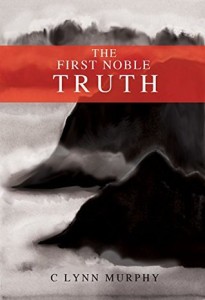 Author, C. Lynn Murphy sent me an ecopy of her novel, The First Noble Truth.
Author, C. Lynn Murphy sent me an ecopy of her novel, The First Noble Truth.
Description from Goodreads:
Machiko Yamamoto pulls out her hair, picks at her skin, and triple checks the locks to the house behind the school where she works. When a foreigner moves into a neighboring thatched roof cottage, she quickly falls in love with the quiet woman with the mangled hand.
Krista Black does not mind the weekly visits from the local English teacher. The scarred woman seems harmless, but she always wants to talk about travel and language and why Krista has come to the remote, Japanese village. Krista avoids her questions. She has seen much of the world, and she knows what it does to fragile people. Machiko may want to know her, but she could never understand her.
Set in Kyoto, New England, Africa and Kathmandu, THE FIRST NOBLE TRUTH is a story of redemption, interwoven between two protagonists, across two cultures. It peers beneath the comfort of expected storytelling to investigate the dualities of suffering and joy, religion and sex, and cruelty and kindness.
Review:
This book is, first and foremost, beautiful. The use of language is absolutely breathtaking. Yes, some would say it’s fully purple, overly detailed and clarity is compromised for poetic effect, and it’s occasionally true. But less often than one would expect, considering. This is the sort of book you can slow down and read just for the sheer joy of feeling the rhythm of the words sliding over your tongue as it slowly builds itself into something substantial.
The plot does wander at times, taking long detours into the interesting but largely irrelevant lives of side characters and such. Further, the use of both first and third person narratives was an interesting one. If I had to choose one main character, it would be Machiko, the third person narrative (which seems wrong to start with). The story is set in her third person present, with most of Krista’s first person narrative being of past events. And they often felt like strange detours themselves, not becoming relevant until the very end when the two women’s lives finally truly intersected.
Thus, I felt I knew what made Krista Krista, but didn’t interact with her present self enough to connect to her character. As if all that history was actually a third character. While so much of Machiko’s internal thought process was explained, I knew her present self well, but not much of what made up her character outside of her Trichotillomania. Though it’s worth noting that Murphy’s descriptions of Machiko’s compulsions were enough to make me want to pick my skin and pull my hair. I definitely related to the character’s tendencies more than I should have been able to.
One of my favourite aspects of this book is all the wonderful characters who provided amazing love and support to the two main characters. I think it’s rare to find a book with no easily identifiable villain and in which authors manage to create believable bonds of friendship and family. It endeared them all to me.
The story itself is heartbreaking, if subtle. Sorrow and suffering is the underlying theme of the book and it’s not hidden. The two women lead very different lives, with very different causes for their different types of suffering. But neither is less legitimate than the other. And in the end, the reader is left with what is probably the only ray of hope in the whole book. (Yes, I cried.)
This is definitely a book worth picking up and taking your time with.
